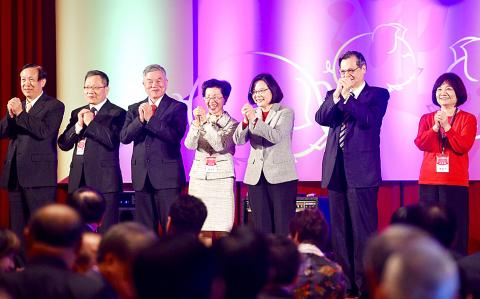Now is the best time for Taiwanese businesses to return home, President Tsai Ing-wen (蔡英文) said at a Lunar New Year banquet in Taipei for Taiwanese businesspeople operating in China.
At the Grand Hotel yesterday, Tsai said that although she is no longer Mainland Affairs Council minister, her concern for overseas businesspeople remains the same.
While the Taiwanese economy faces challenges such as a global economic slowdown and weakening trade demand, and changes in US-China trade relations, these challenges also present an opportunity for improvements, Tsai said.

Photo: Peter Lo, Taipei Times
To respond to these challenges, the government is working on three major initiatives: expanding domestic demand, assisting overseas businesses to return and invest in Taiwan, and marketing Taiwan globally, she said.
The government hopes that an increase in domestic demand could offset the decline in exports and allow the economy to grow at a steady rate, she said, adding that she looks forward to overseas businesspeople playing an important role in this process.
For overseas Taiwanese businesses, the most effective response to global economic conditions would be to move production back to Taiwan, she added.
Now is the best opportunity, she said, calling on overseas businesses to switch their products from being “made by Taiwanese businesses” to being “made in Taiwan.”
Taiwan welcomes returning businesses with open arms, she said, adding that this year, the government proposed a business-oriented action plan devoted to eliminating investment hurdles.
A customized, one-stop service integrates various aspects of investment, such as land, labor, water supply, electricity and taxes, she said.
The government is working with greater intensity on developing strategic partnerships with countries covered by the New Southbound Policy, she said.
Straits Exchange Foundation Chairwoman Katharine Chang (張小月) said that nearly 600 guests — the highest in years — attended the banquet, which was sponsored by the foundation, the Mainland Affairs Council, the Ministry of Economic Affairs, the Chinese National Federation of Industries and the General Chamber of Commerce of the Republic of China.
At the banquet, Tsai also discussed cross-strait relations, saying: “We have never opposed cross-strait exchanges.”
Given China’s geographic proximity, it is natural and inevitable that the two countries would interact in areas affecting tourists, businesses and marriages, she said.
However, these interactions should not be restricted or disturbed by any sort of political framework or preconditions, she said, adding that only with equal dignity can Taiwan and China create a mutually beneficial situation.
Taiwan, as a responsible member of the international community, would continue maintain stable cross-strait relations, but that responsibility should be shouldered by all players in the region, Tsai said.
Chang said that cross-strait exchanges should be founded on humanity and kindness, adding that no political preconditions should be set.
She said she hopes that Taiwanese businesspeople in China would not be put in a difficult position.

Right-wing political scientist Laura Fernandez on Sunday won Costa Rica’s presidential election by a landslide, after promising to crack down on rising violence linked to the cocaine trade. Fernandez’s nearest rival, economist Alvaro Ramos, conceded defeat as results showed the ruling party far exceeding the threshold of 40 percent needed to avoid a runoff. With 94 percent of polling stations counted, the political heir of outgoing Costa Rican President Rodrigo Chaves had captured 48.3 percent of the vote compared with Ramos’ 33.4 percent, the Supreme Electoral Tribunal said. As soon as the first results were announced, members of Fernandez’s Sovereign People’s Party

EMERGING FIELDS: The Chinese president said that the two countries would explore cooperation in green technology, the digital economy and artificial intelligence Chinese President Xi Jinping (習近平) yesterday called for an “equal and orderly multipolar world” in the face of “unilateral bullying,” in an apparent jab at the US. Xi was speaking during talks in Beijing with Uruguayan President Yamandu Orsi, the first South American leader to visit China since US special forces captured then-Venezuelan president Nicolas Maduro last month — an operation that Beijing condemned as a violation of sovereignty. Orsi follows a slew of leaders to have visited China seeking to boost ties with the world’s second-largest economy to hedge against US President Donald Trump’s increasingly unpredictable administration. “The international situation is fraught

MORE RESPONSIBILITY: Draftees would be expected to fight alongside professional soldiers, likely requiring the transformation of some training brigades into combat units The armed forces are to start incorporating new conscripts into combined arms brigades this year to enhance combat readiness, the Executive Yuan’s latest policy report said. The new policy would affect Taiwanese men entering the military for their compulsory service, which was extended to one year under reforms by then-president Tsai Ing-wen (蔡英文) in 2022. The conscripts would be trained to operate machine guns, uncrewed aerial vehicles, anti-tank guided missile launchers and Stinger air defense systems, the report said, adding that the basic training would be lengthened to eight weeks. After basic training, conscripts would be sorted into infantry battalions that would take

GROWING AMBITIONS: The scale and tempo of the operations show that the Strait has become the core theater for China to expand its security interests, the report said Chinese military aircraft incursions around Taiwan have surged nearly 15-fold over the past five years, according to a report released yesterday by the Democratic Progressive Party’s (DPP) Department of China Affairs. Sorties in the Taiwan Strait were previously irregular, totaling 380 in 2020, but have since evolved into routine operations, the report showed. “This demonstrates that the Taiwan Strait has become both the starting point and testing ground for Beijing’s expansionist ambitions,” it said. Driven by military expansionism, China is systematically pursuing actions aimed at altering the regional “status quo,” the department said, adding that Taiwan represents the most critical link in China’s